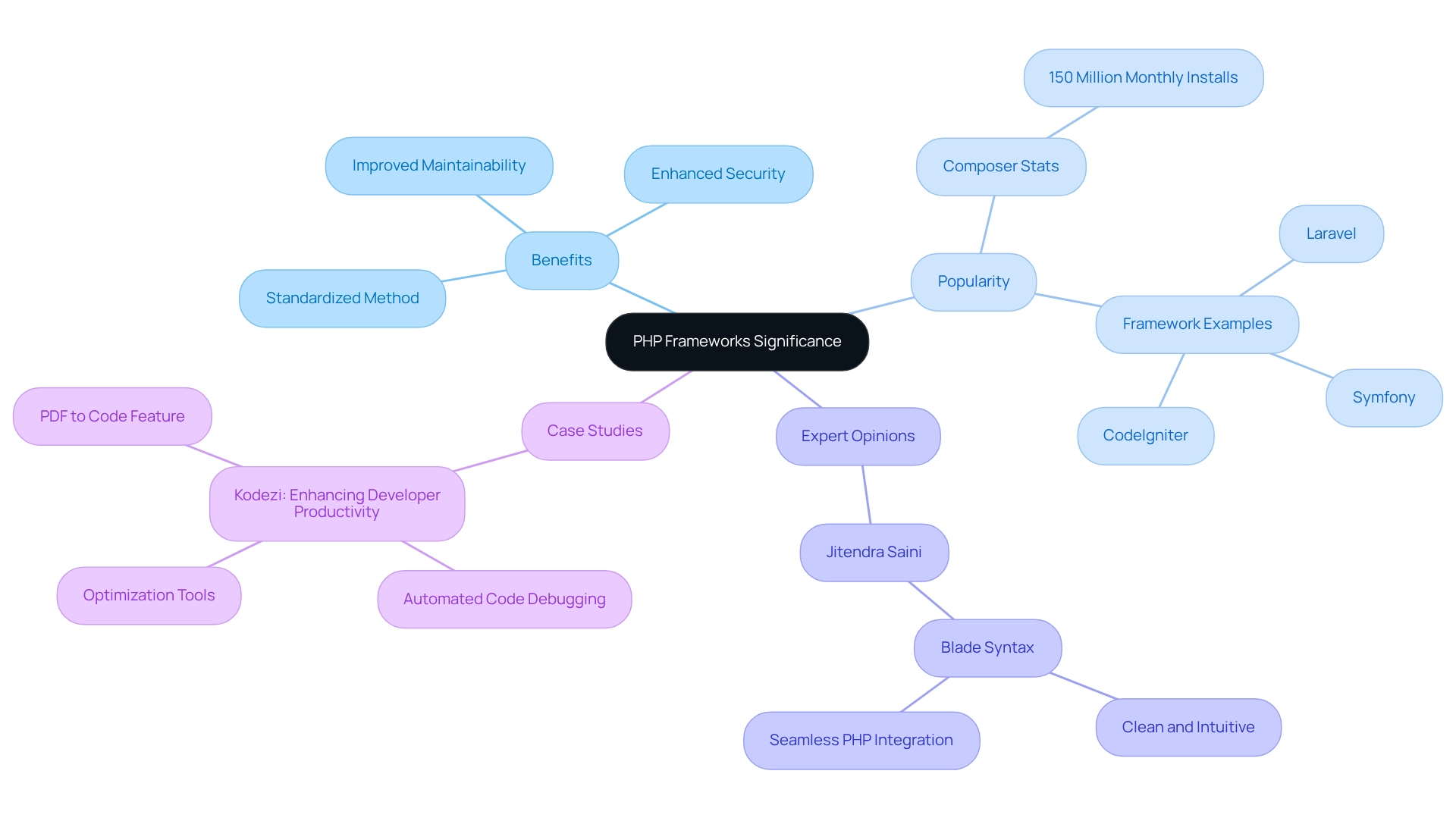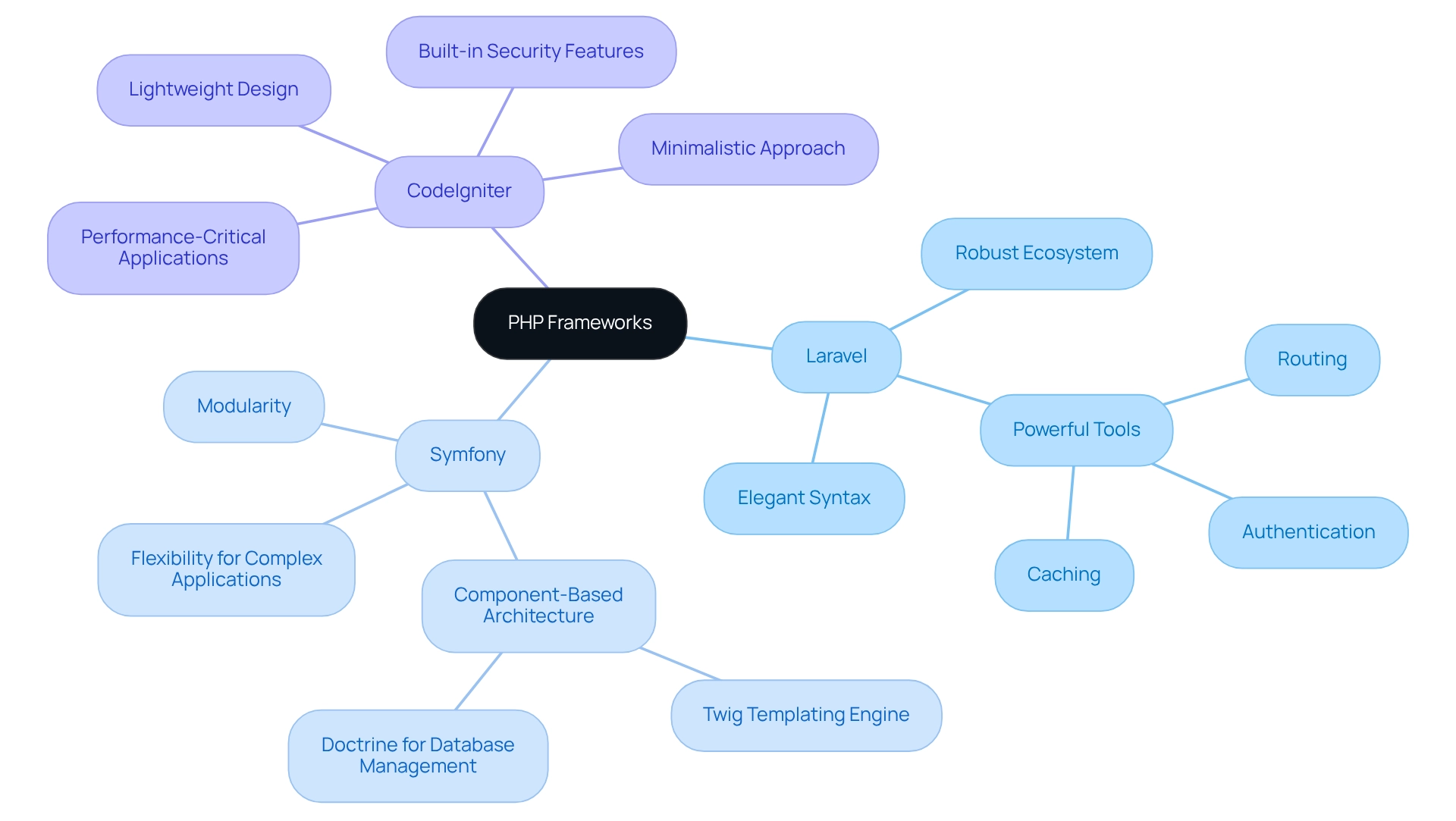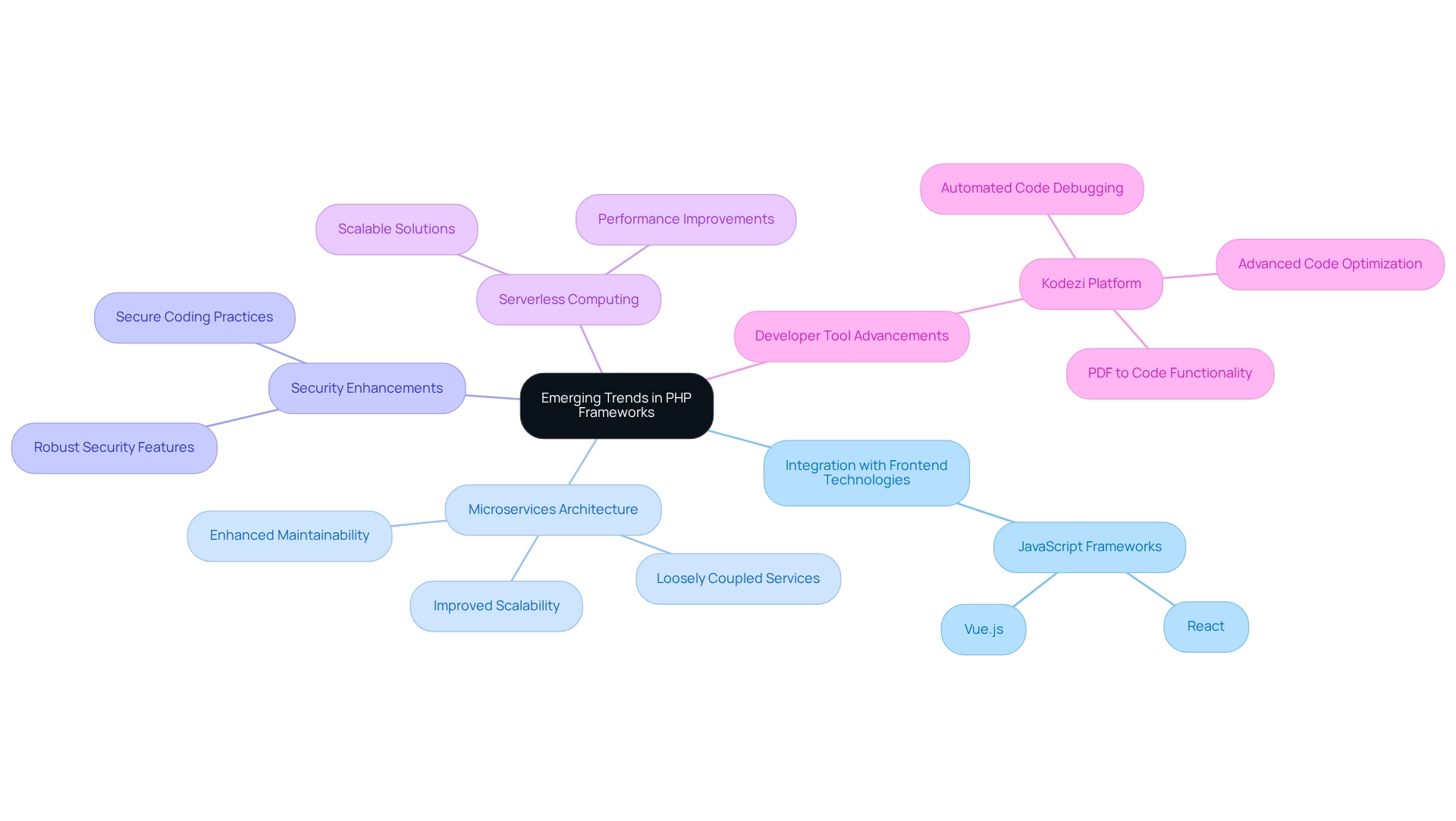Overview
The challenges of web development can often be daunting for developers, particularly when it comes to ensuring security and maintainability. PHP frameworks, such as Laravel and Symfony, emerge as essential tools that simplify this process through their pre-built components. Furthermore, they enhance security and improve maintainability, making them invaluable in the modern coding landscape.
These frameworks cater to various project needs, addressing the common pain points developers encounter. In addition, they are increasingly integrating with modern technologies, which further solidifies their relevance. The emphasis on security within these frameworks is particularly noteworthy, as it aligns with the growing concern for safeguarding applications in an evolving digital environment.
As developers seek to navigate these complexities, the benefits of using PHP frameworks become clear. They not only boost productivity but also enhance code quality, making the development process more efficient and reliable. By exploring the capabilities of frameworks like Laravel and Symfony, developers can significantly improve their workflow and project outcomes.
Introduction
In the ever-evolving landscape of web development, developers often face significant challenges in creating dynamic applications. PHP frameworks have emerged as indispensable tools that address these challenges by streamlining the development process. By providing a structured collection of pre-built libraries and tools, these frameworks not only enhance productivity but also promote best practices that lead to more secure and maintainable code.
As developers increasingly turn to frameworks like Laravel, Symfony, and CodeIgniter, understanding their significance becomes crucial for anyone navigating the complexities of modern programming. Furthermore, with the rise of new technologies and methodologies, the relevance of PHP frameworks is set to grow even further.
It is essential to explore their key advantages, essential features, and the emerging trends that are shaping their future.
Understanding PHP Frameworks: Definition and Significance
In the world of web development, coding challenges are a common hurdle for many developers. PHP structures, organized sets of pre-existing libraries and tools, play a crucial role in addressing these challenges. They provide a standardized method for application creation, encouraging best practices and significantly reducing the amount of repetitive code programmers must write. The significance of PHP structures is demonstrated by the popularity of PHP frameworks, which simplify the development process, enhance security, and improve code maintainability. By adhering to established design patterns, such as Model-View-Controller (MVC), these structures empower developers to build scalable and robust applications effectively.
Furthermore, the importance of PHP structures is underscored by their widespread adoption, with Composer, a prominent dependency manager for PHP, achieving over 150 million package installs monthly in 2025. This statistic highlights the active engagement of developers with PHP structures and their libraries, illustrating how these tools streamline dependency management and boost overall development efficiency. In addition, the popularity of PHP frameworks such as Laravel, Symfony, and CodeIgniter has made them indispensable resources for developers striving to create high-quality web applications. For instance, Kodezi, a platform designed to enhance developer efficiency, exemplifies the value of these systems by offering tools for automated code debugging and optimization. With Kodezi CLI, teams can auto-repair codebases in mere seconds, ensuring that their code meets professional standards while leveraging the structured approach of PHP systems to enhance maintainability.
Similarly, expert opinions reinforce the significance of PHP systems in modern web development. They not only streamline the coding process but also contribute to better code maintainability, which is vital for the long-term success of projects. As PHP evolves, the popularity of PHP frameworks plays an essential role in fostering efficient, secure, and maintainable web applications. Moreover, hosting services like Kinsta provide rapid upgrades to the latest PHP versions, such as PHP 8, motivating developers to keep their systems updated and further enhancing the performance and security of their applications. As Jitendra Saini notes, Blade offers a clear and user-friendly syntax for creating HTML templates, seamlessly incorporating PHP code within views. This demonstrates the advantages of utilizing PHP structures in terms of code maintainability and developer efficiency.

Key Advantages Driving PHP Framework Adoption
The challenges developers face in coding can be significant. However, the adoption of PHP structures significantly enhances the popularity of PHP frameworks by offering several compelling advantages that address these issues effectively. Primarily, they accelerate the creation process by providing pre-built components and libraries. This allows developers to focus on application logic rather than repetitive coding tasks.
For instance, the popularity of PHP frameworks such as Laravel and Symfony is especially preferred for enterprise initiatives due to their strong characteristics and scalability. Conversely, the popularity of PHP frameworks such as CakePHP and CodeIgniter makes them ideal for quick prototyping, enabling teams to complete projects rapidly without sacrificing quality. This choice should align with the specific requirements of a project, as case studies demonstrate that understanding the strengths and weaknesses of different structures enhances efficiency in progress, especially considering the popularity of PHP frameworks, which also offer essential advantages such as security.
They come equipped with built-in features that protect against common vulnerabilities, including SQL injection and cross-site scripting (XSS). Notably, PHP 8 introduces performance improvements and new features like JIT compilation and union types, further enhancing the security and efficiency of applications. In today’s digital landscape, where data breaches can have severe consequences, addressing aspects such as error handling and file upload security is crucial, particularly given the popularity of PHP frameworks, which encourage code reusability and maintainability, easing collaboration among programming teams and aiding in managing large codebases.
As Rasmus Lerdorf, the creator of PHP, noted, 'The orderly and clean code also makes it easy for new PHP programmers to join the team in the middle of a project without becoming lost in the code.' The organized characteristics of systems improve debugging and testing procedures, resulting in a more effective development workflow. Additionally, the combination of frontend technologies and AI is influencing the future of PHP structures, which contributes to the growing popularity of PHP frameworks among programmers. Consequently, developers are progressively embracing PHP structures to enhance efficiency and ensure the delivery of high-quality, secure applications.
Essential Features of Popular PHP Frameworks
When selecting the right PHP framework for their projects, developers often encounter numerous challenges related to the popularity of PHP frameworks. The popularity of PHP frameworks such as Laravel, Symfony, and CodeIgniter stems from their ability to meet diverse needs, with each framework offering unique features that can significantly enhance the development process.
Laravel stands out for its elegant syntax and robust ecosystem. It provides powerful tools for routing, authentication, and caching, streamlining the development process. Furthermore, Symfony is renowned for its adaptability and modularity, allowing programmers to select only the components essential for their projects. This flexibility makes it particularly efficient for large enterprise applications, with its component-based architecture supporting high customization. For example, its integration with the Twig templating engine and Doctrine for database management exemplifies this adaptability.
In addition, CodeIgniter is known for its lightweight design, making it ideal for performance-critical applications and straightforward setups. This framework is a preferred choice for smaller projects, as its minimalistic approach prioritizes speed without sacrificing functionality. It incorporates built-in security features that enhance the application development experience. However, it is important to note that CodeIgniter's structure does not specifically provide ORM functionalities, which may be found in other frameworks. Significantly, its emphasis on simplicity and speed ensures the production of secure, high-performance applications.
Among these frameworks, shared characteristics include extensive documentation and integrated security measures, which together enable the construction of robust applications. As developers weigh their options, the choice often comes down to specific project requirements and personal preferences. The popularity of PHP frameworks is highlighted by Laravel's excellence in rapid creation with its extensive features, Symfony's unmatched flexibility for complex applications, and CodeIgniter's fast and efficient solution for smaller projects. Each framework presents distinct benefits that cater to various aspects of web development.

Emerging Trends and Future Directions in PHP Frameworks
The future of PHP structures is being shaped by several key trends that reflect the evolving demands of web development. One significant trend is the growing integration of PHP frameworks with modern frontend technologies, particularly JavaScript frameworks like React and Vue.js. This collaboration enables developers to create more dynamic and responsive web applications, significantly enhancing user experience. Furthermore, the adoption of microservices architecture is gaining momentum, allowing developers to build applications as a collection of loosely coupled services. This approach greatly improves scalability and maintainability, making it easier to manage complex systems. Security remains a critical concern, driving the development of structures with robust security features and adherence to industry standards. As cyber threats become increasingly sophisticated, the focus on secure coding practices is paramount. In addition, the rise of serverless computing is influencing the design of PHP structures, emphasizing performance improvements in cloud environments. This transition not only boosts efficiency but also meets the growing demand for scalable solutions.
According to a leading web technology research firm, PHP is utilized by 76.2% of all websites with a known server-side programming language, highlighting its significance in the current web development landscape. The Kodezi platform exemplifies how PHP structures can enhance programmer efficiency by providing tools that improve code quality and streamline workflows, particularly for those managing PDF instructions. Kodezi CLI, specifically, acts as a versatile tool for B2B engineering teams, autonomously refining codebases and rectifying bugs before they reach production. With a '5 minute quickstart' and an option to 'See a demo,' Kodezi positions itself as the Swiss-Army Knife for programmers, empowering developers to boost productivity and elevate code quality. These trends collectively suggest a promising future for the popularity of PHP frameworks, as they adapt to meet the needs of modern web development while integrating AI and other emerging technologies.

Conclusion
The significance of PHP frameworks in modern web development is paramount. These frameworks serve as essential tools that streamline the development process, enhance security, and improve code maintainability. With a structured approach through pre-built libraries and components, frameworks like Laravel, Symfony, and CodeIgniter enable developers to focus on application logic rather than repetitive coding tasks. This not only accelerates development but also promotes best practices crucial for long-term project success.
What advantages drive the adoption of PHP frameworks? From robust security features to promoting code reusability, these frameworks facilitate efficient collaboration among development teams and simplify the management of extensive codebases. Furthermore, as the landscape evolves, the integration of modern technologies and methodologies, such as frontend frameworks and microservices architecture, enhances the relevance of PHP frameworks in delivering high-quality applications.
Looking ahead, emerging trends indicate a bright future for PHP frameworks. The continuous evolution towards more secure, scalable, and efficient solutions aligns with the growing demands of developers and businesses alike. As PHP maintains its position as a dominant server-side language, the frameworks built around it will continue to adapt, ensuring that developers have the tools necessary to navigate the complexities of modern web development successfully. Embracing these frameworks not only elevates productivity but also ensures the delivery of secure and maintainable applications that meet the challenges of today and tomorrow.
Frequently Asked Questions
What are PHP structures, and why are they important in web development?
PHP structures are organized sets of pre-existing libraries and tools that provide a standardized method for application creation. They are important because they encourage best practices, reduce repetitive coding, and help developers build scalable and robust applications.
How do PHP frameworks contribute to the development process?
PHP frameworks simplify the development process by enhancing security, improving code maintainability, and adhering to established design patterns like Model-View-Controller (MVC), which empowers developers to create effective applications.
What is the significance of Composer in PHP development?
Composer is a prominent dependency manager for PHP that has achieved over 150 million package installs monthly in 2025, highlighting its role in streamlining dependency management and boosting overall development efficiency.
Which PHP frameworks are considered essential resources for developers?
Essential PHP frameworks include Laravel, Symfony, and CodeIgniter, which are widely used by developers to create high-quality web applications.
How does Kodezi enhance developer efficiency?
Kodezi enhances developer efficiency by providing tools for automated code debugging and optimization, allowing teams to auto-repair codebases quickly and ensuring that their code meets professional standards.
What expert opinions support the significance of PHP systems in web development?
Experts emphasize that PHP systems streamline the coding process and contribute to better code maintainability, which is vital for the long-term success of projects.
How does hosting service Kinsta support PHP developers?
Kinsta provides rapid upgrades to the latest PHP versions, such as PHP 8, motivating developers to keep their systems updated, which enhances the performance and security of their applications.
What advantages does Blade offer in PHP development?
Blade offers a clear and user-friendly syntax for creating HTML templates, allowing seamless incorporation of PHP code within views, which contributes to better code maintainability and developer efficiency.




